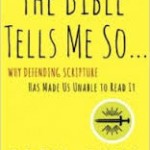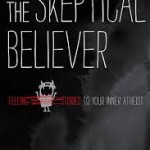 I am posting below–anonymously and with permission–(1) an Amazon review of TBTMS
I am posting below–anonymously and with permission–(1) an Amazon review of TBTMS and (2) an email I received the same day.
Both say nice things about me, but that’s not my point (believe me or not). (And if you’re still annoyed, remember that plenty of people say bad things about me, so it balances out.)
I’m posting them because they represent the experiences of two of the kinds of readers I am aiming for in TBTMS.
The Amazon review is by a graduate from a conservative seminary and the email is from someone not of faith but moving toward it. Those who have already read TBTMS will recognize important themes of the book (especially from chapters 1 and 4) in the communications below.
(I removed irrelevant portions from the Amazon review–which you can always go read yourself–and I made some formatting adjustments to both, such as bold type and paragraph divisions.)
********
(1) The Bible Tells Me So is the third book that I have read now from Peter Enns.
Nearly two years ago, I initially came across Inspiration and Incarnation by accident. Having recently graduated from a neo-Reformed seminary, I remembered that Enns’s work had been described there as “dangerous” by the students, and as “problematic” by the faculty — like contraband. Yet with anything akin to contraband, I could not help but wonder what all of the so-called controversy was about with the book. Why avoid engagement with a person or a topic if it is as solid as [other] people suggest?
Like many recently graduated seminarians, I still had many questions that were left unanswered. Where was I to go? Should I treat seminary like a closed book or like a stepping stone that takes me to new places in theology? Those two options seem to be common for graduates, especially of evangelical schools.
Opting for adventure, I took the risk and began reading it, although, I admit, I read it in private. Sadly, my reason for doing this was because I did not want other friends from seminary and in my denomination to find out that I was actually engaging with Enns’s material.
If they found out that I was considering his arguments, let alone reading them, I feared what that might mean for my life and my hopes for pursuing vocational church ministry in the future. I could be blacklisted, because, I was in possession of contraband.
What I encountered then took my breath away, and in many ways, I am still reveling in what Enns’s arguments introduced me to in the world of biblical scholarship. In short, Enns was one of the voices who forced me to consider that my seminary education was insulated from the rest of the world and academia, and quite frankly, that was very upsetting for me.
This contributed to a major conflict in my life, but one that I look back upon now with gratitude: if I was to take the Bible seriously, as I had been taught, how should I respond to a text like this one? Should I consider the strength of these arguments and look further into similar discussions? What if it challenged the system of doctrine that I had been taught? What would that mean to someone like me and my future?
Or was I to immediately reject them and revert to the system of biblical interpretation that I had been taught in seminary and to that which was normative in my conservative Reformed denomination? In other words, I had two options: take a risk or play it safe.
So, I opted for the latter and two years later, after a complete paradigm shift, I do not regret my decision at all.
Throughout the past two years, I have read other books and various articles that make the similar arguments as Enns’s did with Inspiration and Incarnation. I was looking forward to the day when I could find a book that would condense the arguments into a broad overview that I could give to others who asked the same questions as I did years ago as a college student and as a seminarian.
How else could you expect to describe biblical criticism to someone desiring to know more about it, especially to someone who has only heard nasty things about critical scholarship–like, all critical scholars rip Bibles apart for fun or use them for coasters?
The Bible Tells Me So not only continues this conversation with these same themes that were introduced several years ago in Inspiration and Incarnation, but Enns makes these topics accessible for all people, whether or not they have studied religion at the collegiate or graduate level. If you are coming from an insulated background in the church or seminary, then you can be assured that Enns is not the only person out there speaking in this way.
In addition, Enns puts a Christological focus on the interpretation of Old and New Testament texts which should give comfort to readers who might be wondering about the conclusions that Enns is drawing from his critical examination of the Old Testament while reading along in the book.
Coming from someone who works in a church, I think that this book would be of wonderful help for people as young as high school (as long as they are avid readers) and up, especially those who are frustrated with evangelical and/or fundamentalist readings of the biblical text.
******
(2) Dear Dr. Enns,
I am not a Christian, but in my inexorable crawl towards the faith many barriers have fallen. The biggest barrier to date has been in my reading of the OT — it actually pulled me farther away.
I decided to pretend I knew nothing about Christianity (or Judaism) and just read it from page one at face value. As you can imagine, this was an epic fail.
To conclude any of the things I’ve been told about God would be like watching Star Wars (1977, the only “real” one) and thinking “gosh, what a great romantic comedy.” It reads like an ancient historical novel with fantastical elements, perhaps the first “fantasy novel” where God is this enigmatic bad guy and somehow smaller than The Creator of this unfathomable mathematical universe (or multiverse).
The premise of The Bible Tells Me So on how to approach the Bible just makes so much sense to me and is an intellectually honest way to get God off the hook. This barrier of mine has now fallen. I have Adam Hamilton (Making Sense of the Bible) and you to thank for that. Nevertheless, I have [a] question that [has] stumped me for a couple of years now:
In the handful of verses in Exodus where God calls the Israelites “a stiff necked people” he commands them to go without him because if he goes with them he just might destroy them all. What’s troubling to me is not simply that he seems like the bad guy about to pop his cork, but that he is a being with limited faculties (i.e. not omniscient).
If they go without him, they are removed from his presence and he won’t know what they’re up to (so they’ll be safe from his wrath). If God is omniscient, how could he not know what they’re up to? This seems to make God smaller than what he should be. Your thoughts on this … ?
I hope to hear from you soon. In the meantime, I’ll enjoy reading Inspiration and Incarnation.











